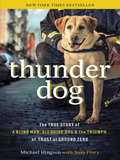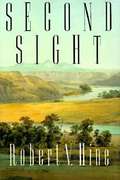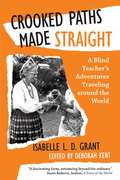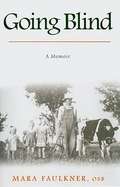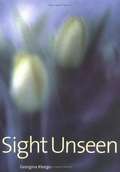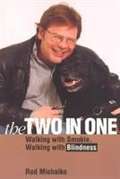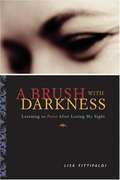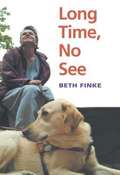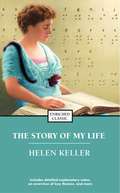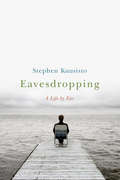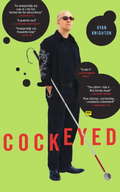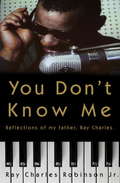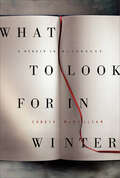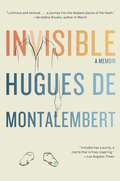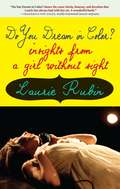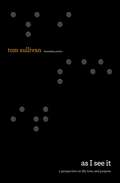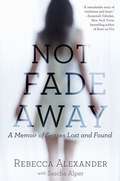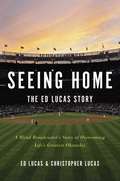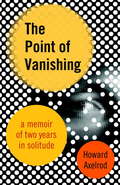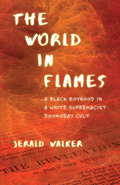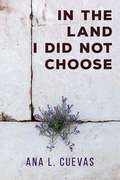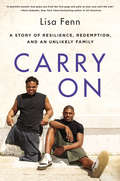Special Collections
Blindness and Visual Impairment Special Collection
Description: A collection featuring biographies, memoirs, fiction and non-fiction by and about members of the blind community. #disability
- Table View
- List View
One of the Lucky Ones
by Lucy Ching
Many people might think me unlucky because I am blind, writes Lucy Ching in this poignant autobiography, but I prefer to think of myself as one of the lucky ones.
Indeed, Lucy Ching's achievements despite total blindness would be outstanding in any time and place- especially so in China of the 1930s, where the blind were treated as outcasts and blind children were sometimes sold into slavery by their own families. Lucy Ching was fortunate enough to be kept at home with her parents, but as she reveals in this remarkable memoir, her triumph over her disability was due to her own fierce determination... and to a very special friendship. Under the devoted care of her amah, an illiterate servant woman who was guided only by common sense, intuition and affection for the child, Lucy Ching learned to live in a sighted world, vowing to have the independence and fulfillment of a profession.
As a child, Lucy taught herself to read and write in braille and was allowed to attend school with sighted children. And, quite against the beliefs of her family, she converted to Christianity and made a solemn promise to God that her lifework would be to help the blind. Lucy's unflagging dedication was rewarded with a scholarship to the Perkins School for the Blind in Boston, where she received the special training which has enabled her to carry out her promise.
My life could have been spent in enforced idleness and isolation, observes Lucy Ching, cut off from other people and their lives and problems. But I was luckier than that. God had other plans for me.
Like Helen Keller, she found herself, her work and her God through affliction. Today Lucy Ching is a social worker in Hong Kong, where she works with the blind as well as other handicapped people.
Thunder Dog
by Larry King and Michael Hingson and Susy FloryFaith. Trust. Triumph.
"I trust Roselle with my life, every day. She trusts me to direct her. And today is no different, except the stakes are higher." ?Michael Hingson
First came the boom?the loud, deep, unapologetic bellow that seemed to erupt from the very core of the earth. Eerily, the majestic high-rise slowly leaned to the south. On the seventy-eighth floor of the World Trade Center's north tower, no alarms sounded, and no one had information about what had happened at 8:46 a.m. on September 11, 2001?what should have been a normal workday for thousands of people. All that was known to the people inside was what they could see out the windows: smoke and fire and millions of pieces of burning paper and other debris falling through the air.
Blind since birth, Michael couldn't see a thing, but he could hear the sounds of shattering glass, falling debris, and terrified people flooding around him and his guide dog, Roselle. However, Roselle sat calmly beside him. In that moment, Michael chose to trust Roselle's judgment and not to panic. They are a team. Thunder Dog allows you entry into the isolated, fume-filled chamber of stairwell B to experience survival through the eyes of a blind man and his beloved guide dog. Live each moment from the second a Boeing 767 hits the north tower, to the harrowing stairwell escape, to dodging death a second time as both towers fold into the earth.
It's the 9/11 story that will forever change your spirit and your perspective. Thunder Dog illumiates Hingson's lifelong determination to achieve parity in a sighted world, and how the rare trust between a man and his guide dog can inspire an unshakable faith in each one of us.
Second Sight
by Robert V. HineThe author talks about when he goes blind, the things that happen to him, and when he regains his sight
Crooked Paths Made Straight
by Deborah Kent and Isabelle L. D. GrantIn 1959, two years before she retired from teaching, Dr. Isabelle Grant set off on a yearlong journey around the world with Oscar, her long white cane, in her hand. She had been totally blind for the past twelve years.
In Crooked Paths Made Straight, she shares the story of her journey during which she visited twenty-three countries from Great Britain to Fiji. In Karachi, she traveled the streets by rickshaw and struggled to master the Urdu language. In India, she explored the Taj Mahal, and in Burma she slept in a room where lizards raced up and down the walls.
At a time when both women and blind people were generally seen as too helpless for solo travel, Grant fearlessly defied conventions. A dedicated teacher with a lifelong commitment to learning, her mission was to learn all she could about education in the countries she visited, in particular the education provided to blind children.
Completed in 1965, Crooked Paths Made Straight recounts Grant's journey, a story of dreams deferred that did not shrivel but sprang to life again and again.
My Eyes Have A Cold Nose
by Hector ChevignyThe author says that when he became blind, he thought it would be a great nuissance, and indeed it was. He maintains that the greatest problem for blind people is society's fixed notions that blind people are utterly helpless and utterly tragic, and he describes how he and other blind people have dealt with this problem. One of the key parts of his rehabilitation was his training at The Seeing Eye. This book is old, but still relevant in many ways.
Going Blind
by Mara FaulknerMara Faulkner grew up in a family shaped by Irish ancestry, a close-to-the-bone existence in rural North Dakota, and the secret of her father's blindness--along with the silence and shame surrounding it. Dennis Faulkner had retinitis pigmentosa, a genetic disease that gradually blinded him and one that may blind many members of his family, including the author.
Moving and insightful, Going Blind explores blindness in its many Permutations-within the context of the author's family, more broadly, as a disability marked by misconceptions, and as a widely used cultural metaphor. Mara Faulkner delicately weaves her family's story into an analysis of the roots and ramifications of the various metaphorical meanings of blindness, touching of the Catholic Church of the 1940s, and 1950s, Japanese internment, the Germans from Russia who dominated her hometown, and the experiences of Native people in North Dakota.
Neither sentimental nor dispassionate, the author asks whether it's possible to find gifts when sight is lost.
Sight Unseen
by Georgina KleegeThis elegantly written book offers an unexpected and unprecidented accout of blindness and sight. Legally blind since the age of eleven, Georgina Kleege draws on her experiences to offer a detailed testimony of visual impairment - both her own view of the world and the world's view of the blind. "I hope to turn the reader's gaze outward, to say not only 'Here's what I see' but also "here's what you see,' to show what's both unique and universal," Kleege writes.
Kleege describes the negative social status of the blind, analyzes stereotypes of the blind hat have been perpetuated by movies, and discusses how blindness has been portrayed in literature. She vividly conveys the visual experience of someone with severely impaired sight and explains what she cannot (and how her inability to achieve eye contact - in a society that prizes that form of connection - has affected her).
Finally she tells of the various ways she reads, and the freedom she felt when she stopped concealing her blindness and acquired skills, such as reading braille, as part of a new blind identity.
The Two-In-One
by Rod MichalkoWhen Rod Michalko's sight finally became so limited that he no longer felt safe on busy city streets, he began to search for a guide.
The Conquest of Blindness
by Henry Randolph LatimerThe term "Conquest of Blindness" is taken to include any preventive, remedial, educational, rehabilitating, or relief phase of work pertaining to the handicap of blindness.
The primary aim of the volume is to lift work for the conquest of blindness out of the miasma of alms and asylums into the more wholesome atmosphere of social adjustment.
Other aims of the volume are to serve as a supplementary text for the use of the profession, and as an incentive to the chance reader to delve more deeply into the subject, and to present as modestly as may be the autobiography of one blind person who has contributed in small measure toward the conquest of blindness.
A Brush With Darkness
by Lisa FittipaldiWhen Lisa Fittipaldi went blind at the age of forty-seven, she descended into a freefall of anger and denial that lasted for two years. In this moving memoir, she paints a vivid picture of the perceptual and emotional darkness that accompanied her vision loss, and her arduous journey back into the sighted world through mastery of the principles of art and color.
Long Time, No See
by Beth FinkeLong Time, No See is certainly an inspiring story, but Beth Finke does not aim to inspire. Eschewing reassuring platitudes and sensational pleas for sympathy, she charts her struggles with juvenile diabetes, blindness, and a host of other hardships, sharing her feelings of despair and frustration as well as her hard-won triumphs. Rejecting the label "courageous," she prefers to describe herself using the phrase her mother invoked in times of difficulty: "She did what she had to do." With unflinching candor and acerbic wit, Finke chronicles the progress of the juvenile diabetes that left her blind at the age of twenty-six as well as the seemingly endless spiral of adversity that followed. First she was forced out of her professional job. Then she bore a multiply handicapped son. But she kept moving forward, confronting marital and financial problems and persevering through a rocky training period with a seeing-eye dog. Finke's life story and her commanding knowledge of her situation give readers a clear understanding of diabetes, blindness, and the issues faced by parents of children with significant disabilities. Because she has taken care to include accurate medical information as well as personal memoir, Long Time, No See serves as an excellent resource for others in similar situations and for professionals who deal with disabled adults or children.
The Story of My Life
by Helen KellerEnriched Classics offer readers accessible editions of great works of literature enhanced by helpful notes and commentary. Each book includes educational tools alongside the text, enabling students and readers alike to gain a deeper and more developed understanding of the writer and their work.Left blind, deaf, and mute after an illness in infancy, Helen Keller overcame her disabilities with the help of Anne Sullivan, her inspired teacher. Her classic autobiography, first published in 1903, covers her first twenty-two years, including the memorable moment at a water pump when she first made the connection between the word "water" and the cold liquid flowing over her hand. She also discusses her friendships with Oliver Wendell Holmes and other notables, her education at Radcliffe, her joy at learning to speak, and above all, her extraordinary relationship with her teacher. This deeply moving memoir, full of love and compassion for others, offers an unforgettable portrait of one of the twentieth century's most remarkable women. Enriched Classics enhance your engagement by introducing and explaining the historical and cultural significance of the work, the author's personal history, and what impact this book had on subsequent scholarship. Each book includes discussion questions that help clarify and reinforce major themes and reading recommendations for further research. Read with confidence.
Eavesdropping
by Stephen KuusistoA memoir of blindness and listening rendered with a poet's delight by the author of the acclaimed Planet of the Blind. Blind people are not casual listeners. Blind since birth, Stephen Kuusisto recounts with a poet's sense of detail the surprise that comes when we are actively listening to our surroundings. There is an art to eavesdropping. Like Annie Dillard's An American Childhood or Dorothy Allison's One or Two Things I Know for Sure, Kuusisto's memoir highlights periods of childhood when a writer first becomes aware of his curiosity and imagination. As a boy he listened to Caruso records in his grandmother's attic and spent hours in the New Hampshire woods learning the calls of birds. As a grown man the writer visits cities around the world in order to discover the art of sightseeing by ear. Whether the reader is interested in disability, American poetry, music, travel, or the art of eavesdropping, he or she will find much to hear and even "see" in this unique celebration of a hearing life.
Cockeyed
by Ryan KnightonThis irreverent, tragicomic, politically incorrect, astoundingly articulate memoir about going blind?and growing up?illuminates not just the author's reality, but the reader's.
You Don't Know Me
by Mary Jane Ross and Ray Charles RobinsonA deeply personal memoir of the private Ray Charles - the man behind the legend - by his eldest son.Ray Charles is an American music legend. A multiple Grammy Award-winning composer, pianist, and singer with an inimitable vocal style and a catalog of hits including "What I Say," "Georgia on My Mind," "Unchain My Heart," "I Can't Stop Loving You," and "America the Beautiful," Ray Charles's music is loved by fans around the world.Now his eldest son, Ray Charles Robinson Jr., shares an intimate glimpse of the man behind the music, with never-before-told stories. Going beyond the fame, the concerts, and the tours, Ray Jr. opens the doors of his family home and reveals their private lives with fondness and frankness.He shares his father's grief and guilt over his little brother's death at the age of five -- as well of moments of personal joy, like watching his father run his hands over the Christmas presents under their tree while singing softly to himself. He tells of how Ray overcame the challenges of being blind, even driving cars, riding a Vespa, and flying his own plane. And, in gripping detail, he reveals how as a six-year-old boy he saved his father's life one harrowing night.Ray Jr. writes honestly about the painful facts of the addiction that nearly destroyed his father's life. His father's struggles with heroin addiction, his arrests, and how he ultimately kicked the drug cold turkey are presented in unflinching detail. Ray Jr. also shares openly about how, as an adult, he fell victim to the same temptations that plagued his father.He paints a compassionate portrait of his mother, Della, whose amazing voice as a gospel singer first attracted Ray Charles. Though her husband's drug use, his womanizing, and the paternity suits leveled against him constantly threatened the stability of the Robinson home, Della exhibited incredible resilience and inner strength.Told with deep love and fearless candor, You Don't Know Me is the powerful and poignant story of the Ray Charles the public never saw -- the father and husband and fascinating human being who also happened to be one of the greatest musicians of all time.From the Hardcover edition.
What to Look for in Winter
by Candia McWilliamThe British literary sensation—“the most startling, discomforting, complicated, ungovernable, hilarious and heart-rending of memoirs ” (The Telegraph)—the story of a celebrated writer’s sudden descent into blindness, and of the redemptive journey into the past that her loss of sight sets in motion. Candia McWilliam, whose novels A Case of Knives, A Little Stranger, and Debatable Land made her a reader favorite throughout the United Kingdom and around the world, here breaks her decade-long silence with a searing, intimate memoir that fans of Lorna Sage’s Bad Blood, Mary Karr’s Lit, and Diana Athill’s Somewhere Toward the End will agree “cements her status as one of our most important literary writers beyond question” (Financial Times).
Invisible
by Hugues De MontalembertThe impressionistic memoir of an artist who was blinded in a sudden act of violence, leading to a profound meditation on what it means to see and be seen. "You live in a city like New York. You read the papers. You look at the television. But you never think it will happen to you. It happened to me one evening. " One summer night in 1978, Hugues de Montalembert returned home to his New York City apartment to find two men robbing him. In a violent struggle, one of the assailants threw paint thinner in Hugues' face. Within a few hours, he was completely blind. Eloquent and provocative, Invisible moves beyond the horrific events of that night to what happened to Hugues after he lost his sight: his rehabilitation, his solo travels around the world, and the remarkable way he learned to "see" even without the use of his eyes. Without a trace of self-pity, Hugues describes his transition from an up-and-coming painter to a blind man who had to learn to walk with a cane. His status changed in the eyes of other people as their reactions ranged from avoidance to making him their confidant. Hugues traveled to faraway places and learned to trust strangers and find himself at home in any situation. Part philosophy, part autobiography, part inspiration, Invisible will change the way readers understand reality and their place in the world.
Do You Dream in Color?
by Laurie RubinColors, Rubin tells us, affect everyone through sound, smell, taste, and a vast array of emotions and atmospheres. She explains that although she has been blind since birth, she has experienced color all her life. In her memoir Do You Dream in Color?, Laurie Rubin looks back on her life as an international opera singer who happens to be blind. From her loneliness and isolation as a middle school student to her experiences skiing, Rubin offers her young readers a life-story rich in detail and inspiration drawn from everyday challenges. Beginning with her childhood in California, Rubin tells the story of her life and the amazing experiences that led her to a career as an internationally celebrated mezzo-soprano. Rubin describes her past as a "journey towards identity," one she hopes will resonate with young people struggling with two fundamental questions: "Who am I?" and "Where do I fit in?" Although most of us aren't blind, Rubin believes that many of us have traits that make us something other than "normal." These differences, like blindness, may seem like barriers, but for the strong and the persistent, dreams can overcome barriers, no matter how large they may seem. This is what makes her story so unique yet universal and so important for young readers.
As I See It
by Tom SullivanAn inspirational memoir of a man's rich life experiences without sight, but with an enormous sense of wonder in the world around him. Bestselling author Tom Sullivan explores life without sight and finds it rich and rewarding. In fact, he's gleaned a number of gifts from his "affliction," including: * I've never assessed my relationship with people according to the limits of labels or assumption. * I've enjoyed a world of senses available to all of us but almost never explored by the majority of those with sight. * I've made challenge my road to limitless opportunity. * I've cultivated a clear sense of my own purpose. * I've learned to be passionate, celebrating my own uniqueness through the expression of that passion. * I've found a powerful faith that has become my foundation for living. * I've learned to love unconditionally through the interdependent relationship I share with my wife, Patty, and my children. Through insightful stories and emotive writing, Tom describes a life of fullness, not lack, as he's made blindness a positive. For Tom Sullivan--author, actor, athlete, singer, entertainer, and producer--a life with blindness has been a life with very few true limits. In this elegant exploration of the senses, he considers the different challenges he's faced and explains the wonder he carries because, not in spite, of his blindness.
Not Fade Away
by Rebecca Alexander and Sascha AlperEven a darkening world can be brilliantly lit from within.
Born with a rare genetic mutation called Usher Syndrome type III, Rebecca Alexander has been simultaneously losing both her sight and hearing since she was a child, and was told that she would likely be completely blind and deaf by age 30. Then, at 18, a fall from a window left her athletic body completely shattered.
None of us know what we would do in the face of such devastation. What Rebecca did was rise to every challenge she faced. She was losing her vision and hearing and her body was broken, but she refused to lose her drive, her zest for life and - maybe most importantly - her sense of humor. Now, at 35, with only a sliver of sight and significantly deteriorated hearing, she is a psychotherapist with two masters' degrees from Columbia University, and an athlete who teaches spin classes and regularly competes in extreme endurance races. She greets every day as if it were a gift, with boundless energy, innate curiosity, and a strength of spirit that have led her to places we can't imagine.
In Not Fade Away, Rebecca tells her extraordinary story, by turns harrowing, funny and inspiring. She meditates on what she's lost--from the sound of a whisper to seeing a sky full of stars, and what she's found in return--an exquisite sense of intimacy with those she is closest to, a love of silence, a profound gratitude for everything she still has, and a joy in simple pleasures that most of us forget to notice.
Not Fade Away is both a memoir of the senses and a unique look at the obstacles we all face--physical, psychological, and philosophical--exploring the extraordinary powers of memory, love, and perseverance. It is a gripping story, an offering of hope and motivation, and an exquisite reminder to live each day to its fullest.
Seeing Home
by Ed Lucas and Christopher LucasSoon to be a major motion picture, Seeing Home: The Ed Lucas Story is the incredible true tale of a beloved Emmy-winning blind broadcaster who refused to let his disability prevent him from overcoming many challenging obstacles and achieving his dreams.In 1951, when he was only twelve years old, Ed Lucas was hit between the eyes by a baseball during a sandlot game in Jersey City. He lost his sight forever. To cheer him up, his mother wrote letters to baseball superstars of the day, explaining her son’s condition. Soon Ed was invited into their clubhouses and dugouts, as the players and coaches personally made him feel at home. Despite the warm reception he got from his heroes, Ed was told repeatedly by others that he would never be able to accomplish anything worthwhile because of his limitations. But Hall-of-Famer Phil Rizzuto became Ed’s mentor and encouraged him to pursue his passion—broadcasting. Ed then overcame hundreds of barriers, big and small, to become a pioneer—the first blind person covering baseball on a regular basis, a career he has successfully continued for six decades. Ed may have lost his sight, but he never lost his faith, which got him through many pitfalls and dark days. When Ed’s two sons were very young, his wife walked out and left him to raise them all by himself, which he did. Six years later, Ed’s ex-wife returned and sued him for full custody, saying that a blind man shouldn’t have her kids. The judge agreed, tearing Ed's sons away from their father's loving home. Ed fought the heartbreaking decision with appeals all the way up to the highest level of the court system. Eventually, he prevailed, marking the very first time in US history that a disabled person was awarded custody over a non-disabled spouse. Even in his later years, Ed is still enjoying a remarkably blessed life. In 2006, he married his second wife, Allison, at home plate in old Yankee Stadium, the only time that such a thing ever happened on that iconic spot. Yankee owner George Steinbrenner himself catered the whole affair, which was shown live on national television. Seeing Home: The Ed Lucas Story is truly a magical read and a universally uplifting and inspirational tale for everyone, whether or not you happen to be a sports fan. Over his long and amazing life, Ed has collected hundreds of anecdotes from his personal relationships and encounters with everyone, from kings and presidents to movie stars and sports Hall-of-Famers, many of which he shares in this memoir, using his trademark humorous and engaging style, cowritten with his youngest son, Christopher.
The Point of Vanishing
by Howard AxelrodInto the Wild meets Portrait of the Artist as a Young Man--a lyrical memoir of a life changed in an instant and of the perilous beauty of searching for identity in solitude On a clear May afternoon at the end of his junior year at Harvard, Howard Axelrod played a pick-up game of basketball. In a skirmish for a loose ball, a boy's finger hooked behind Axelrod's eyeball and left him permanently blinded in his right eye. A week later, he returned to the same dorm room, but to a different world. A world where nothing looked solid, where the distance between how people saw him and how he saw had widened into a gulf. Desperate for a sense of orientation he could trust, he retreated to a jerry-rigged house in the Vermont woods, where he lived without a computer or television, and largely without human contact, for two years. He needed to find, away from society's pressures and rush, a sense of meaning that couldn't be changed in an instant.From the Trade Paperback edition.ions of perception, time, identity, and meaning.From the Trade Paperback edition.
The World in Flames
by Jerald WalkerA memoir of growing up with blind, African-American parents in a segregated cult preaching the imminent end of the world.
When The World in Flames begins, in 1970, Jerry Walker is six years old. His consciousness revolves around being a member of a church whose beliefs he finds not only confusing but terrifying. Composed of a hodgepodge of requirements and restrictions (including a prohibition against doctors and hospitals), the underpinning tenet of Herbert W. Armstrong's Worldwide Church of God was that its members were divinely chosen and all others would soon perish in rivers of flames.
The substantial membership was ruled by fear, intimidation, and threats. Anyone who dared leave the church would endure hardship for the remainder of this life and eternal suffering in the next. The next life, according to Armstrong, would arrive in 1975, three years after the start of the Great Tribulation. Jerry would be eleven years old.
Jerry's parents were particularly vulnerable to the promise of relief from the world's hardships. When they joined the church, in 1960, they were living in a two-room apartment in a dangerous Chicago housing project with the first four of their seven children, and, most significantly, they both were blind, having lost their sight to childhood accidents. They took comfort in the belief that they had been chosen for a special afterlife, even if it meant following a religion with a white supremacist ideology and dutifully sending tithes to Armstrong, whose church boasted more than 100,000 members and more than $80 million in annual revenues at its height.
When the prophecy of the 1972 Great Tribulation does not materialize, Jerry is considerably less disappointed than relieved. When the 1975 end-time prophecy also fails, he finally begins to question his faith and imagine the possibility of choosing a destiny of his own.
In The Land I Did Not Choose
by Ana L. CuevasPrejudice and discrimination against people with mental and physical disabilities still exist. Ana L. Cuevas, a blind woman, knows this all too well. But she also knows compassion, love, and courage. This book is a testament to her determination to reach her dreams no matter the obstacles. As a young girl, Ana moved to the United States from Mexico against her will. Her parents picked this country, and though it has its faults, Ana is forever grateful. This land is where she received the proper education and tools to lead a full life. However, while researching pregnancy and disabilities, Ana realizes she is considered different in the eyes of others. Many "able-bodied" people assume blindness affects intelligence, speech, and other capabilities. Knowing this changes the way Ana looks at the world. This is a problem that must be addressed by the public and the government to alleviate prejudices and help people with disabilities achieve the same success as their peers. This poignant memoir will have you cheering, crying, and standing up for love and acceptance of all people in this world. It is a must-read for counselors, social workers, psychologists, and teachers.
Carry On
by Lisa Fenn“An incredible life-affirming story” about an unexpected, lifechanging relationship between an ESPN producer and two disabled, inner-city athletes (Family Circle). When award-winning ESPN producer Lisa Fenn returned to her hometown for a story about two wrestlers at one of Cleveland’s toughest public high schools, she had no idea that the trip would change her life. Both young men were disadvantaged students with significant physical disabilities. Dartanyon Crockett was legally blind as a result of Leber’s disease; Leroy Sutton lost both his legs at eleven, when he was run over by a train. Brought together by wrestling, they had developed a brother-like bond as they worked to overcome their disabilities.After forming a profound connection with Dartanyon and Leroy, Fenn realized she couldn't just walk away when filming ended; these boys had had to overcome the odds too many times. Instead, Fenn dedicated herself to ensuring their success long after the reporting was finished and the story aired—and an unlikely family of three was formed.The years ahead would be fraught with complex challenges, but Fenn stayed with the boys every step of the way—teaching them essential life skills, helping them heal old wounds and traumatic pasts, and providing the first steady and consistent support system they’d ever had.This powerful memoir is one of love, hope, faith, and strength—a story about an unusual family and the courage to carry on, even in the most extraordinary circumstances.“A poignant memoir.” —Sports Illustrated“A profoundly moving memoir about two boys who become men in the face of life’s toughest challenges:. We see the many ways in which one person can carry another, and we are inspired to do the same.” —Tim Howard, New York Times–bestselling author of The Keeper“‘An astonishingly beautiful tale . . . like The Blind Side or Same Kind of Different As Me, Lisa Fenn’s work forces us to reframe our definition of family.” —Kevin Salwen, author of The Power of Half“A heartfelt memoir that grips you from the first page and pulls at your soul until the end” —Steve Eubanks, New York Times–bestselling author of All American

